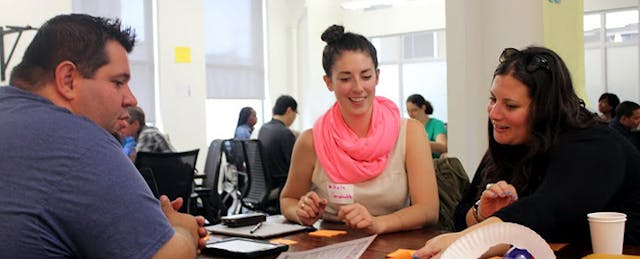This fall, Gradeable was selected to participate in Innovate NYC Schools, an incredible program that helps bring innovation and technology to underserved schools in New York City. It’s the first year of the program, and we at Gradeable were super excited to be included. Innovate NYC Schools is run by a team at the New York Department of Education and pairs teachers and product developers who work in teams for five months to improve classroom environment and drive learning.
Here’s how the program works: Innovate NYC Schools pairs 12 schools each with a different product, and each product works with a team of four teachers who implement the product into their classrooms. We meet with these teachers biweekly to get their feedback on Gradeable and discuss how the product could most easily fit into their daily routine. Gradeable is a combined standards-based grading tool and online portfolio, and we were really excited to have these teachers using the product.

Check out photos of the first workshop above, which was about empathy-driven design skills. At Gradeable, teacher-driven product design is part of our DNA, and the program has given us opportunities for deep and meaningful engagement with NYC public school teachers and a chance to prove that we can be effective in an urban school environment. It’s important that we’re using our time in NYC as solid experience for the development process. We believe strongly that developers shouldn’t build in a vacuum. That’s why we do a lot of listening, and ask a lot of questions.
After the first three months of the program, we definitely feel that our teachers deserve some serious bragging rights. Not only do they come out to workshops and events on Friday evenings and Saturdays after what are undoubtedly some crazy busy weeks at the start of the school year, but they also ask amazing questions from the very beginning and are completely engaged in our product development process.
During our first few sessions, though, our teachers kept apologizing for asking so many questions, which is really surprising. This type of feedback helps designers and developers like me get inside their minds, hear their concerns, see what they’re most excited about, and often come up with new ideas and features that help make the product better. Not to mention, it feeds my not-so-secret desire to talk about the product constantly as if it’s my first-born child.
What I love about working with our teachers is that they have so many ideas and comments to make, they can hardly get them all out. My reaction is usually ‘more please!’ because I can’t wait to hear what else they have to say. Product demos should never be a one-way street, and luckily this has never been a problem.
The Gradeable team includes two English teachers and two history teachers. Even in a small group of four teachers, we’ve found a range of teaching styles, varying technology expertise, and differing approaches to creating assessments. For example, some teachers like to create their assessments from scratch while others used New York State templates. Learning about how different individuals intend to incorporate Gradeable into their classrooms plays a critical role in how we develop our product.
Now that our teachers have been using Gradeable for a while, our team has been focused on helping them create exit tickets and small, formative assessments for their classes. We’ve learned about the types of data they need in classrooms since New York State and the New York public school system have new requirements. The teachers want to use the data Gradeable provides as artifacts to track learning development and to show improvement.
We love the conversations that have come out of interacting with our teachers: the different ways they’d like to integrate Gradeable into their classrooms, areas they see room for improvement, or new features they think would be useful. If you use an edtech product, please speak up about what you need, what new features you’d like to see, and what questions you have. Don’t be shy. That’s how great products are designed--and our classrooms will be better because of it.


